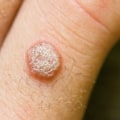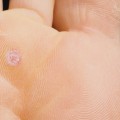Genital warts are a common sexually transmitted infection (STI) caused by the human papillomavirus (HPV). This virus is spread through direct skin-to-skin contact with someone who has HPV on their skin. It can be transmitted through vaginal, anal, and oral sex, as well as close sexual contact with the genital area. Even if there are no visible warts, HPV may still be active in the genital area and spread to other people.
Genital warts are fleshy growths that form around the genitals or anus. They are caused by certain types of HPV, which can be spread through sexual activity. It may take several weeks or months after infection for warts to start developing. Genital warts can also appear on the lips, mouth, tongue, or throat of a person who has had oral sexual contact with an infected person.
Genital warts can cause changes in the cervix (dysplasia) that can lead to cervical cancer. People should not apply treatments designed to remove warts from the hands or feet on the genitals. It is important to share this information with your sexual partners if you know that you have genital warts and HPV. Limiting the number of sexual partners and getting vaccinated will help prevent you from getting genital warts.
Using a condom every time you have sex is a good idea, but it won't necessarily protect you from genital warts. Couples should be seen by a healthcare provider who can detect genital warts and test for other STDs. The doctor may apply a mild acid solution, called a white sorrel test, to the skin to help make genital warts more visible. However, on rare occasions, genital warts can multiply in large groups in people with a weakened immune system.
This may seem difficult, but talking openly about your condition can help protect your partner from also getting an HPV infection and genital warts. Genital warts aren't usually painful, but they can cause itching, skin discoloration, or discomfort, and may bleed. The HPV vaccine can protect against certain types of HPV, including those that cause genital warts and certain types of cancer. According to the National Cancer Institute, about 90 percent of genital warts are caused by low-risk HPV types 6 and 11.










